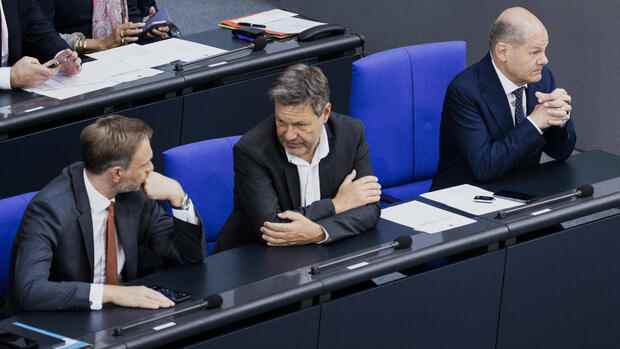The federal government is making many promises about new relief. How this is to be financed remains unclear.
(Photo: IMAGO/photothek)
Anyone who meets a politician these days should be careful: government officials tend to throw money at their citizens. “Nobody is left alone,” is how the chancellor put it, which has recently become somewhat imaginative.
In the interpretation of the traffic light coalition, this means: All the impositions that the Ukraine war, the energy shock caused by it and inflation in general, will be cushioned, if not compensated, by the state.
That’s a pretty bold claim – but it represents the saving basic consensus of the traffic light coalition. Whenever the SPD wants to give the weak in society the necessary help, Christian Lindner from the FDP makes sure that the upper classes don’t miss out either come.
The Minister of Finance countered the “social climate money” of the Socialists with the fuel discount, from which well-earning SUV drivers benefit disproportionately. The demand for a significant increase in the distance allowance by the Liberals follows the new citizens’ allowance from the Social Democratic Minister of Labor. And SPD leader Lars Klingbeil meanwhile claims, beyond the economic mainstream, that one cannot “save” one’s way out of inflation.
Top jobs of the day
Find the best jobs now and
be notified by email.
Ergo: there’s still something going on. An increase in the saver’s allowance, as Lindner is planning? Willingly. An extension of the nine-euro ticket, as even the Liberals are now demanding? Always.
In any case, the next major relief package is already being planned. And of course there will be no tax increase, and the debt brake should take effect again in the coming year – the Liberals guarantee both.
It’s not just the economists who are asking themselves how all of this is supposed to fit together. The “national effort” that the Green Robert Habeck always talks about seems to be something like the private opinion of the Minister of Economics. After all, the Vice-Chancellor has enough sense of reality to introduce a gas surcharge in October to save some of the German energy companies from bankruptcy – most notably Uniper. Of course, the amount of the levy is still being debated: no unreasonable demands!
Fear as a driver
Discouragement or even fear are the drivers of this policy. The Federal Chancellor fears “social explosives”, the Economics Minister a “ordeal” and Foreign Minister Annalena Baerbock even “popular uprisings”.
The concern is that if people lose too much, they will vote for extreme parties or perhaps rebel themselves. At the very least, the concern is that support for the government’s Ukraine policy will dwindle.
Of course, many of the measures taken by the federal government are correct when viewed individually. Especially when it comes to alleviating social hardship. All in all, however, the feel-good policy per watering can stirs up expectations that it can hardly fulfill.
100 billion euros for national defence, which Germany has outsourced to the USA more or less free of charge for decades, the digital conversion, the gigantic costs of the necessary energy transition – the state can hardly afford all of this anymore.
Ultimately, the inflation rates that were considered impossible until recently and the sharp rise in capital market interest rates are unmistakable signs that the state is reaching its limits in fully comprehensive mode.
And that’s not all: the fuel discount and energy subsidy program override price signals that are indispensable for the goal of saving energy. The most efficient way to do this would be to consistently pass on the rising energy prices and only relieve those in need in a targeted manner. It sounds paradoxical and possibly even immoral: but this crisis can only be overcome in the long term when its consequences are felt by the public.
>> Read also: Germany can survive the winter without Russian gas – if another 210 terawatt hours are saved
Financial crisis, pandemic, war in Russia and soon a difficult and threatening dispute with China over the Taiwan issue: the state is overwhelmed. That’s why, more than ever, it needs responsible citizens who can handle burdens, who understand that this war will undoubtedly cost prosperity.
The bitter and cynical truth: In the confrontation with the authoritarian regimes in Moscow and Beijing, it is not only who decides who can do the most harm to whom. Perhaps more important is the willingness of the respective populations to endure pain. And this is where Vladimir Putin and Xi Jinping, with their repressive state power apparatus, see the advantages on their side.
Whether they are right is not only in the hands of the government, but above all the citizens. Sometimes a “blood, sweat and tears speech” à la Winston Churchill helps. But the chancellor prefers to say: “You’ll never walk alone.”
More: Lindner wants to raise the savings allowance to 1,000 euros
